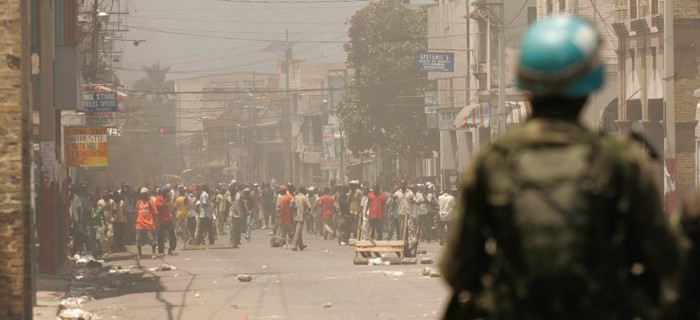“Twin Tsunamis?”
The World Food Program described the global food crisis as a “silent tsunami” surging over an unaware populace, helpless in the face of massive destruction. The financial crisis—rapidly going global—now threatens to increase everyone’s vulnerability to hunger. The compound effect of the twin crises seems overwhelming.
But though hunger and financial shock may come in waves, not everyone will “drown” in famine or financial ruin. In fact, both crises are making a handful of investors and multinational corporations very rich—even as they devastate the poor and put the rest of the planet at severe environmental and economic risk. Thus far there has been little leadership on the food crisis, and the sketchy $700 billion U.S. bailout for a few giant financial houses is a desperate attempt to keep credit flowing through a stumbling economy. There are, unfortunately, no guarantees. Already, when we need them the most, farmers are running into problems finding production credit.
Though massive and destructive, the food and financial crises are anything but silent, or natural, and— as long as we are aware of their true causes—we are not helpless.
The food crisis ushered in the financial crisis. Now the financial crisis is exacerbating the food crisis. No one knows how deeply, broadly, or for how long the financial crisis will affect economies around the world. All we know is that the storm is coming, and we will need to lay up reserves and reach out to our family, friends and neighbors to ride it out. How do we do that?
We need to build our economic resilience by building food system resilience. As long as our food is tied to a volatile, speculative financial system dominated by a handful of largely-unregulated monopolies and wealthy day traders (gamblers), we will be vulnerable to the wild fluctuations in the global markets that dominate our economies. We’ll be hard pressed to recover from the financial shocks reverberating around globe. Now is the time to protect our local economies by transforming our food systems into engines for local economic development. Does economic development in time of crisis sound crazy? Maybe, just enough. Let’s just take a couple of simple examples: With the crisis, farmers can’t find production credit. Farm-gate prices that were soaring in July, are now crashing as farmers struggle to pay the input costs that jumped 125%. There was never a better time for community-supported agriculture. Food banks, squeezed between longer lines of hungry people, and fewer corporate and government food sources, are turning to local farmers and urban gardens for food. There has never been a better time to finally get agriculture out of the World Trade Organization, establish national grain reserves, renegotiate “free” trade agreements, and re-regulate the industries and markets that have brought our food and finances to ruin.
Do you know what the other good news is? We’ve never been better prepared than we are now to take back our food systems. Recently 700 people representing community groups, food banks, farmer’s organizations, small businesses and many other food justice activists met in Philadelphia for the Community Food Security Coalition’s annual conference. The talent, capability, good will, knowledge and plain, unwavering commitment to a better food system is stronger than ever. And thousands of activists and practitioners met in Guatemala City for the Latin American Social Forum to discuss land reform, sustainable agriculture, fair trade, regional economies, territorial food systems management and other strategies that will help people weather the coming economic shocks. And in Maputo, Mozambique, hundreds of delegates from farm, fisher and pastoralist organizations from around the world attended the Via Campesina gathering to plan their next forceful steps in their global campaign for food sovereignty—the democratization of our food systems. On World Food Day, October 16th, in New York City a broad coalition of farmers, food activists and unions kicked off a nationwide campaign to put the food crisis squarely on the presidential agenda.
We can ride out the twin tsunamis, and we can transform our food system in the process. We have the tools to build equitable, sustainable and democratic food systems. Now is the time!
Stay in the loop with Food First!
Get our independent analysis, research, and other publications you care about to your inbox for free!
Sign up today!Eric Holt-Giménez, PhD
Executive Director, Food First
Also in this issue of News & Views:
- “The Financial Crisis and the Food Crisis: Two Sides of the Same Coin” by Annie Shattuck


 Help Food First to continue growing an informed, transformative, and flourishing food movement.
Help Food First to continue growing an informed, transformative, and flourishing food movement.




